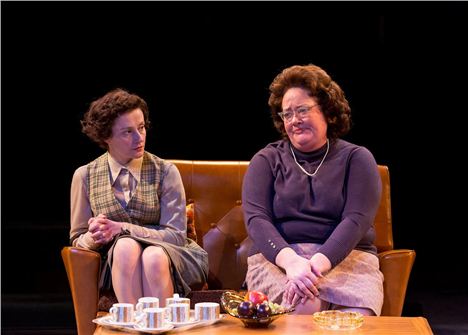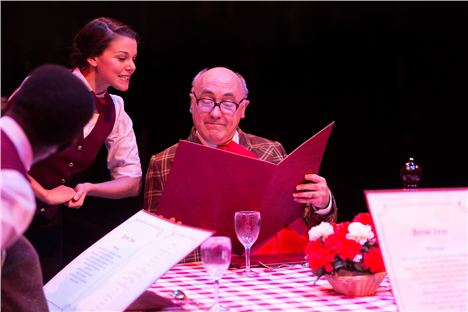DESCRIBED as a big-hearted nostalgic Manchester love story for all the family, Victoria Wood’s That Day We Sang, first seen as a Manchester International Festival 2011 production in The Opera House, has been reinvented and re-orchestrated for the Royal Exchange’s unique space and presented as this year’s Christmas offering.
Director Sarah Francom has sharpened the whole presentation, increasing the focus on the children and ensuring that while enjoying the pricks in the pomposity of others we’re still aware of their humanity and our own occasional pompous leanings.
The story is based around the Manchester School Children’s Choir recording of Henry Purcell’s Nymphs and Shepherds in 1929. This was a million selling record, a popular choice for radio’s Children’s Favourites well into the sixties, as was the B-side: the rather more lively Humperdinck’s dance duet from Hansel and Gretel. Then, as now, Manchester’s ability to engage with ‘high culture’, to enhance it and to make it appeal to a wide audience came as a surprise to many, though probably not many Mancunians.
That Day We Sang looks back at the experience through the eyes of two fictional characters, ‘Tubby’ and Enid, both single and somewhat shy, who meet when Granada TV brings former choir members together to celebrate the fortieth anniversary of the recording.
The production lovingly presents all Victoria Wood’s trademarks: we examine ourselves, the large and small disappointments in life, its small triumphs charted through gentle self-deprecating cruelty-free comedy and the constant references to brands from the past, once so highly thought of, now viewed with a mix of affection and disdain – Berni Inns, mint Matchmakers, and Wimpy’s tomato ketchup holders.
 Anna Francolini as Enid Sutcliffe and Sally Bankes as Dorothy Brierley
Anna Francolini as Enid Sutcliffe and Sally Bankes as Dorothy Brierley
Its move to the round stage of the Royal Exchange increases the intimacy of the story-telling and the audience cares much more about the characters. Tubby’s repeated rejections drew audience sympathy sounds while Enid’s siren song was met with universal cheers.
The connection is even stronger when the children are on stage, an entrancing, defining feature of this production. During the run there will be three actors alternating the role of Jimmy, Tubby as a child, and three 25-strong children’s choirs. They carry a large part of the show, often unsupported by adults. The theatre-in-the-round setting literally places them centre stage, the height of audience focus. On Press Night we saw and heard Choir A while William Haresceugh from Blackpool took the role of Jimmy, all performing with an engaging commitment and confidence, and adding an excellent sense of comic and musical timing. Choir master Jeff Borradaile deserves the credit here.
Anna Francolini, previously seen in A View From The Bridge, gives an endearing performance as Enid, socially timid yet professionally confident. Dean Andrews, padded for Tubby, a super ego-match for Enid, sings to convey emotion and remind himself of what he can offer and accept.
Sally Bankes, an expert with well-timed comic lines, makes a welcome return, having last been seen in Everybody Loves a Winner aka The Bingo Play. Local actor James Quinn is always a welcome performer whose strong opening performance helps kick-start the audience into comprehending just what is happening.
The MIF production of this play, directed as well as written by Victoria Wood, suffered from the lack of a more detached view. Director Sarah Francom has sharpened the whole presentation, increasing the focus on the children and ensuring that while enjoying the pricks in the pomposity of others we’re still aware of their humanity and our own occasional pompous leanings. Frank and Dorothy Brierley may well be almost insufferable with their boastful pride in sophisticated dining at the Berni, but most of the audience are laughing through self-recognition at times.
 James Quinn as Frank Brierly/Mr Stanley
James Quinn as Frank Brierly/Mr Stanley
James Cotterill’s set design copes well with the limitations of the round, and accepts that there are some things it just can’t do; so we lose the Opera House’s recreation of the Free Trade Hall stage and the Piccadilly-Gardens-with-flowers backdrop, but gain everywhere else. Swings and roundabouts. The frieze of Manchester architecture clips around the first gallery serves well to add a city centre feel to events.
In its first appearance at the third Manchester International Festival this show helped answer the critics who argued that MIF was too elitist. Does it deserve a place at the Royal Exchange is a question some have asked. It’s certainly a feel-good, engaging show, never dull but never deep either to be considered shallow. There is plenty here which is real, and it does evoke an era, two eras in fact, and invite a comparison, not always unfavourable, with modern times.
The press release describes the show as a big-hearted and nostalgic Manchester love story for all the family. Big-hearted without a doubt, with coal scuttles full of nostalgia, and unmistakably Mancunian, but whether there’s enough there to keep children entertained is a different question. Much of the material doesn’t address their concerns, and the tango song routine, set in a bedroom, I doubt would pass Strictly’s watershed requirements.
It wouldn’t be my first choice for a family show, unless one of my family were in that choir, but it is still quite delightful. Maybe it’s more for those who need occasional reminders not to lose touch with their inner child.
That Day We Sang runs at The Royal Exchange Theatre until Saturday 18 January 2014. Photos by Jonathan Keenan.














